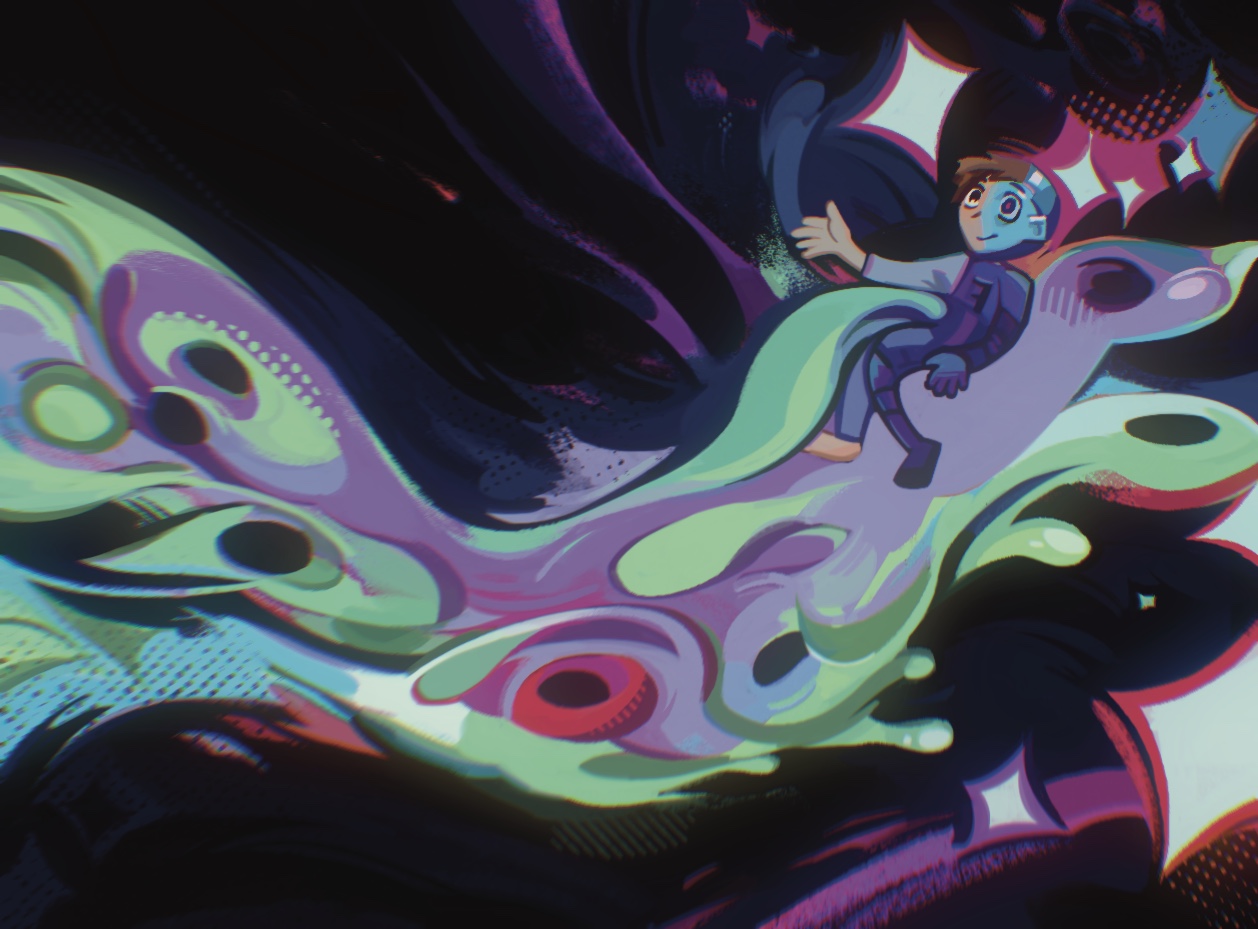Catherine Zhang/OutWrite
This article was originally published in our Winter 2024 print, Freaks. Written by Bellze T.
Content warning: discussions of dehumanization and bodily discomfort, mentions of colonization, fatphobia, and gender dysphoria, slurs
I didn’t want to be human anymore.
I struggled with accepting my full queer self. I had difficulty feeling empathy and emotions. I felt alone in my queer experience while living in the conservative suburbs where I could count the number of queer people I knew on two hands, causing me to doubt its validity. I was terrified of being unable to empathize with other people because I felt off-putting, like they would be able to look through me and see that I wasn’t fully human because I couldn’t feel emotions how I thought people should.
I tried not to feel any of these loud, messy feelings because as a person of color, I wasn’t supposed to have loud, messy feelings. I should have arrived in this country fully formed and humbly grateful for the opportunities provided here, never ever complaining about the capitalistic, heteronormative, patriarchal circumstances that America reinforced. My body dysmorphia fixates on the wrongness of my skin and my fatness. My gender dysphoria fixates on the wrongness of the femininity inscribed into my body. There is a claustrophobia and wrongness to my skin — my body is too big and there is too much of me wishing to be someone, something else.
But if I cannot be human, where else could I go?
I looked up voidpunk on Tumblr (a primary source for many nascent queer people) at the recommendation of a friend after telling them I was afraid of being inhuman.
Voidpunk was conceptualized by Tumblr user @arotaro and coined by Tumblr user @milkchocolateowl in 2018. As described by @arotaro, voidpunk is a subculture that refutes normative society’s idea of what it means to be human and instead celebrates the idea of not being human. Created for marginalized communities who often face dehumanization by an oppressive, normative society, it is commonly expressed through aesthetics of the inhuman. This ranges from the creation of voidsonas — avatars that allow one to reimagine nonhuman bodies — to moodboards that aesthetically depict the creator’s personal connection to voidpunk, or to the simple art of verbalizing the feeling of claiming inhumanity. “There is no one ‘right’ or ‘wrong’ way to be voidpunk,” writes @arotaro.
It is important to recognize that voidpunk was conceptualized and informed by @arotaro’s specific experiences as an allosexual aromantic person. I do not identify along the aromantic and asexual spectrums, but I am greatly indebted to the aroace community in my own experience as a person coming into their queer identity. I particularly want to express my gratitude for the community and their continuous reimagining of ways to be, love, and identify as people.
Voidpunk gave me the feeling of finding a community for the first time. It let me reshape what I thought about being human. Voidpunk’s ability to deconstruct humanity resonated with me because it challenges the fabrication of normality as the heart of assimilation.
The rhetoric surrounding humanity is largely decided by oppressive forces who find it convenient to decide who gets to be human and who does not. Dehumanization is a familiar instrument of colonization and conquest, a forced cognitive dissonance that allows the oppressor to justify violence.
I must ask: Is being human defined by one’s ability to look at an Other and call them inhuman? Does someone else’s ability to call me a faggot or savage make them more human than me?
If these are true, then the question changes from “Am I good enough to be human?” to “Do I even want to be human?”
My discovery of voidpunk was just one of several paths that could have allowed me to confront and reconsider what humanity and living meant to me. Voidpunk, along with many other subcultures that tend to overlap with the queer community, celebrates the feelings commonly shunned for their rejection of the normative, misleading fantasy of hegemony. At the heart of such subcultures is the radical queer notion that takes aim at the minimalist, homogenizing force of aestheticism and politicism that threatens to subsume the LGBTQ+ community.
I don’t feel human, and I don’t need to feel human. Instead of having the label of humanity shoved onto me, I will choose to be with other people and care for them not by virtue of the ideal of humanity, but for the sake of shared experience and care for the living.
Credits:
Author: Bellze T. (They/Xey)
Illustrator: Catherine Zhang (She/Her)
Copy Editor: Niki S. (She/Her)

